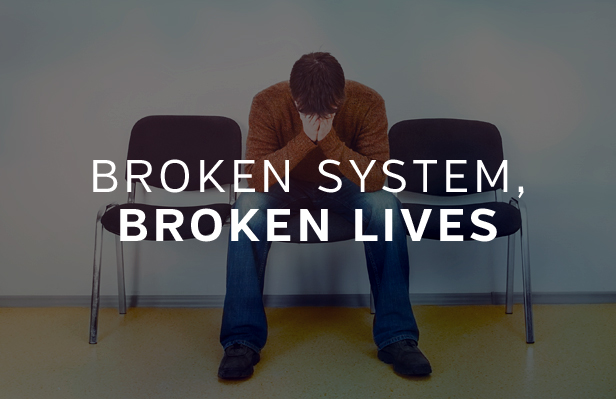Media

4 Obamacare Failures & How to Fix Them
For almost seven years the benefits of Obamacare have been exaggerated and the costs severely underestimated. As repeal efforts gain momentum, many are understandably uncomfortable about another dramatic shift in American health care, but there is plenty of reason for optimism.
Here are four ways Obamacare has failed to improve health care and how lawmakers in DC and Harrisburg can replace those failures with policies that make health care (not just insurance) truly affordable and accessible for all Pennsylvanians.
Failure #1: Cost of Insurance
President Obama famously promised the Affordable Care Act (ACA) would lower premiums by $2,500 for the average family of four. However, the cost of insurance premiums increased dramatically, taking a greater toll on working families.
This year, Pennsylvanians buying insurance on the individual market saw a massive 32.5 percent (on average) increase in insurance premiums. At the same time, average deductibles for gold, silver, and bronze plans rose by $254, or 17 percent, in Pennsylvania for 2016.
For a 27-year old male in the Philadelphia market, the lowest-priced monthly premiums have grown by an astronomical 396 percent since 2013! For that same demographic in the Pittsburgh area, 2017 premiums are 227 percent higher.
Fix: Reduce Mandates
Reducing health insurance benefit mandates and allowing insurance companies to consider a patient's age and health status can go a long way in reducing the cost of health insurance.
Failure #2: Consumer Choice
President Obama's infamous “you can keep your plan” line aside, it's clear Pennsylvanians have fewer choices under the ACA. The average Pennsylvania exchange shopper has only three insurance providers to choose from—with only two serving the Pittsburgh area, and only one option in Philadelphia. In 2013, 14 carriers offered individual health plans to Pennsylvanians on the Obamacare exchange.
Fix: Expand HSAs
Allow insurers to innovate with different types of plans including more options for Health Savings Accounts. Contributions to HSAs should be able to meet a plan's full deductible and be used for premium payments or payments for alternative health delivery models, like yearly membership fees for direct primary care.
Failure #3: The Uninsured
Estimates that over 1 million Pennsylvanians would be uninsured without the ACA are highly misleading. According to U.S. Census data, the number of uninsured in Pennsylvania declined from 2010 to 2015, but by 469,000 residents. Specifically the uninsured rate dropped from 10.2 percent to 6.3 percent. Yet some of this decline can be attributed to improvement in economic conditions and increased employment following the recession. Indeed, the uninsured rate was 7.7 percent in 1999.
Similarly, Gov. Wolf overestimates the number of individuals enrolled in Medicaid expansion. According to state data, Medicaid enrollment in total has increased by 550,000 since December 2014, far fewer than the 690,000 the governor claims.
This embellishment is partly because the state shifted 73,000 individuals already enrolled in Medicaid over to the expansion Medicaid. This was done entirely as an accounting gimmick to benefit from the 100 percent federal reimbursement rate—getting federal tax dollars to pay for individuals already enrolled in Medicaid.
Moreover, there is no evidence these new enrollees were uninsured prior to Obamacare. The Census data actually indicates many Medicaid enrollees left private insurance to enroll in Medicaid. This is particularly problematic given Medicaid is a poor provider of health care.
Fix: Lower the Cost of Care
Forcing everyone to get an insurance card is no solution. Just ask Denise who avoids going to the doctor because her plan carries a $5,000 per person deductible. The real problem is the cost of care. State level reforms to expand the services mid-level providers, like nurse practitioners, can offer and efforts to reward consumers who shop for high value health care are two ways to ensure care is accessible for all regardless of their insurance status.
Failure #4: Medicaid is Broken
The ACA relies heavily on expanding health care access by putting more individuals on Medicaid. Yet Medicaid has a terrible reputation. Medicaid recipients experience more difficulty finding doctors and longer wait times than those with private insurance—thanks to low provider reimbursement and a maze of red tape. Worse, Obamacare's perverse incentives make the neediest Medicaid patients (children, pregnant women, the blind, and the disabled) most vulnerable to benefit cuts.
Fix: Flexibility for States
If there is one thing Pennsylvania needs in a replacement plan, it is flexibility to revamp our Medicaid program at the state level—not just for the expansion population, but for all Medicaid recipients.
Almost half of the Pennsylvania state operating budget (49 percent) is spent on Human Services, with the bulk of that—$26.33 billion—on Medical Assistance and Long Term Living (i.e., Medicaid programs). Medicaid alone consumes more of the state budget than PreK-12 education, higher education, transportation and debt service combined.
According to the Independent Fiscal Office, Medical Assistance and Long Term Living costs are projected to rise by another $844 million next year, from the state general fund alone. Some $200 million of this is the result of the Medicaid expansion reimbursement rate, and other cost increases tied to federal mandates and restrictions on making program changes.
Without flexibility to reform these programs, the commonwealth will have to either raise state taxes or make significant cuts to other areas, such as education or corrections.
Block granting federal Medicaid dollars to the states or granting states Medicaid waivers would allow Pennsylvania the Medicaid flexibility it needs to improve the quality of care and control costs, ensuring the health care safety net is sustainable for all families.
The Affordable Care Act may have resulted in more individuals getting an insurance card, but it has done little to improve the affordability of health care and wreaked havoc on our economy, killing 300,000 jobs in 2015 alone. For health care to be fixed, Obamacare must be left behind.
For more on how to responsibly replace Obamacare, read our letter to Pennsylvania's U.S. congressmen and senators.